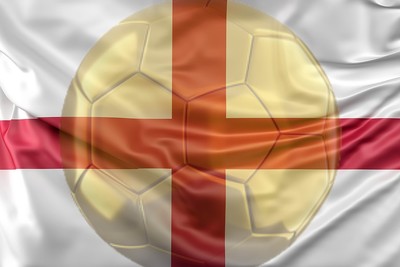 The nature of football is such that it is a team sports first and foremost. Players come together in order to try to succeed as a team, given the fact that a player can be the best on the planet in their position but if they don’t perform well with their teammates then they won’t have any silverware to show for their ability at the end of the season. Most players will choose team success over personal glory for that exact reason, but it doesn’t mean that there is no way of recognising individual brilliance. The Ballon d’Or is there for exactly that reason, being awarded to the best player each year.
The nature of football is such that it is a team sports first and foremost. Players come together in order to try to succeed as a team, given the fact that a player can be the best on the planet in their position but if they don’t perform well with their teammates then they won’t have any silverware to show for their ability at the end of the season. Most players will choose team success over personal glory for that exact reason, but it doesn’t mean that there is no way of recognising individual brilliance. The Ballon d’Or is there for exactly that reason, being awarded to the best player each year.
Of course, there is an argument that a player is unlikely to be rewarded for their individual ability unless their team has also won something, with most Ballon d’Or recipients earning the attention that they get thanks to how well their team has done in competitions during the year. Even so, it is an award that goes to the player that is considered to be the best footballer at the time, with the likes of Cristiano Ronaldo and Lionel Messi dominating it in recent years. Some nations tend to do better than others when it comes to Ballon d’Or winners, so how have England got on in the past?
Quick Answer: How Many English Ballon d’Or Winners Has There Been?
Between 1956 and 2022, four English players have won the Ballon d’Or. They are Stanley Matthews in 1956, Bobby Charlton in 1966, Kevin Keegan in both 1978 and 1979 and Michael Owen in 2001.
France, Germany and Italy have produced the most Ballon d’Or winning players with five each.
Who Decides The Ballon d’Or Winner?

Currently, selected journalists from the top 100 football nations vote for the Ballon d’Or winner
The Ballon d’Or is an award that has been presented every year since 1956, with France Football being the publication behind it. It was conceived by sports writers Gabriel Hanot and Jacques Ferran, with the award going to the male footballer who was believed to have been the best performer over the previous year. It was originally only for for Europe players, with an expansion to include players from anywhere that have played in Europe taking place in 1995. Between 1956 and 2009, the voting for the Ballon d’Or was done solely by football journalists.
In 2007, a decision was taken to allow players from any club in the world to be nominated, expanding voting for the Ballon d’Or, to include journalists from across the planet. Between 2010 and 2015, the Ballon d’Or joined with FIFA’s World Player of the Year award to become the FIFA Ballon d’Or. This brought further changes to voting, with journalist joined by the captains and managers of each national team in selecting their best players that year. This association ended after 2010, with voting returning to football journalists alone.
In 2022, a modification was made by France Football to say that the award would be for achievements during the football season, rather than for during a calendar year. The publication also decided that only the countries in the top 100 of the FIFA World Ranking would have journalist voting rights. It feels important to know the way in which the voting works when looking at English winners of the award.
English Ballon d’Or Winners
Whilst considering which players from England have won the Ballon d’Or over the years, it is perhaps important to note that the voters have come from all across Europe in the past, then from across the world. This matters because, if we’re honest, the English haven’t always been the most popular with people from across Europe and beyond. You only need to look at a competition like EuroVision to get a sense that we’re not well-liked by others. Has this affected the votes that English players have received in the past? It is impossible to say for certain but worth bearing in mind.
Here is a look at the English players that have won the Ballon d’Or:
List of English Ballon d’Or Winners – 1956 to 2022
| Year | Player | Club (League) |
|---|---|---|
| 1956 | Stanley Matthews | Blackpool (First Division) |
| 1966 | Bobby Charlton | Manchester United (First Division) |
| 1978 | Kevin Keegan | Hamburger SV (Bundesliga) |
| 1979 | Kevin Keegan | Hamburger SV (Bundesliga) |
| 2001 | Michael Owen | Liverpool (Premier League) |
Now that we know which English players have been in the receiving end of the Ballon d’Or over the years, it is worth taking a closer look at why they earned the honour that year.
Stanley Matthews (Blackpool) – 1956

Stanley Matthews won the first ever Ballon d’Or in 1956 whilst playing for Blackpool. Photo by Richard Matthews, flickr
In 1956, Stanley Matthews was the winner of the Ballon d’Or thanks to the 47 points he achieved, which was three more points than Real Madrid’s Alfredo Di Stéfano won. It was the inaugural awarding of the trophy, with the rules at the time meaning that only European players playing in Europe could receive it. They were the rules that meant players such as Pelé and Diego Maradona were never recipients of the award. Later to become a knight of the realm, Matthews is considered to be one of the all-time great players and was playing his trade with Blackpool in 1956.
A speedy winger, he was 41 in 1956 and would go on to set the record for the oldest player to get an England cap a year later. The most remarkable thing about Matthews winning the award is the fact that the peak of his career is generally considered to have been lost to the Second World War. Part of the reason for his winning the award was the fact that almost singlehandedly helped Blackpool defeat Bolton Wanderers 4-3 in the FA Cup final of 1953, then three years later, the year he won the award, he helped the seaside club finish second in the First Division, missing out to Manchester United.
Bobby Charlton (Manchester United) – 1966
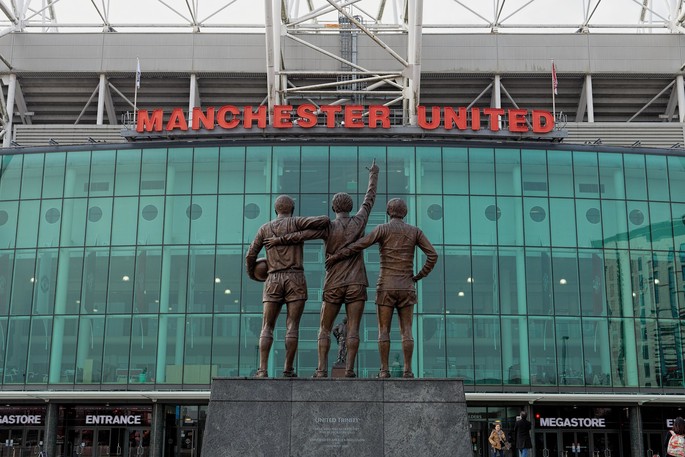
Bobby Charlton along with Denis Law and George Best are known as the Holy Trinity. Photo by Iain Middleton-Duff flickr
A decade later and it was always likely to be an Englishman who won the award when the Three Lions defeated West Germany to win the World Cup. In some ways, Charlton was fortunate to win the award when you consider the fact that he ended up just a point ahead of Portugal’s Eusébio, but in another sense it might well have worked out better for him if Bobby Moore hadn’t received 31 votes, Alan Ball six and Gordon Banks and Geoff Hurst two apiece. In the end, his 81 points was enough to ensure he was crowed Ballon d’Or winner over his Portuguese rival.
He played 38 games for Manchester United in the 1965-1966 season, scoring 16 goals and getting seven assists in the league, seeing the Red Devils finish fourth in the First Division whilst reaching the semi-finals of the FA Cup and the European Cup. It was helping England to that World Cup win that saw him claim the Ballon d’Or, though. He scored three times in the tournament, including two goals against Eusébio’s Portugal in the semi-final, which proved to be more decisive than the nine goals that the Portuguese player managed during the same competition.
Kevin Keegan (Hamburger SV) – 1978 & 1979
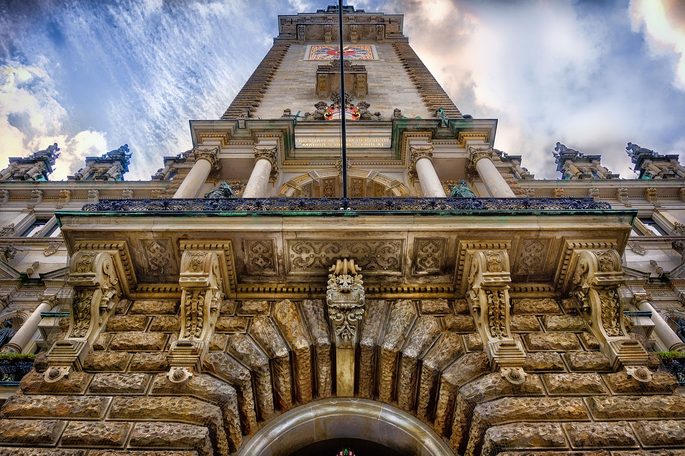
After moving from Liverpool to Hamburg, Kevin Keegan finished runner up in the Ballon d’Or in 1977 before winning in both 1978 and 1979
During his time playing for Liverpool, Kevin Keegan won the First Division three times as well as one European Cup, the FA Cup once and the UEFA Cup twice. His performances earned him a British record move to Hamburger SV for £500,000 in the summer of 1977. The German club had not finished higher than sixth in two decades prior to his arrival, whilst Keegan himself had missed out on being a Ballon d’Or winner by three points that year. That was not to be the case in 1978, however, with 26 voters awarding him a total of 87 points, with his exploits at Liverpool having likely been influential in the voting.
Having been suspended for eight weeks for punching a player, Keegan scored 12 times in his first season in Germany. It was the season that followed in which his exploits in the Bundesliga would be the reason for him winning the award. He helped to propel the team to its first ever Bundesliga title, which worked to keep him high on the list of potential Ballon d’Or winners. He received 118 votes from the 26 voters, which was more than double the number that Karl-Heinz Rummenigge had received in second place. It meant he joined Alfredo di Stefano, Franz Beckenbauer and Johan Cruyff players to have won the Ballon d’Or more than once at that time.
Michael Owen (Liverpool) – 2001
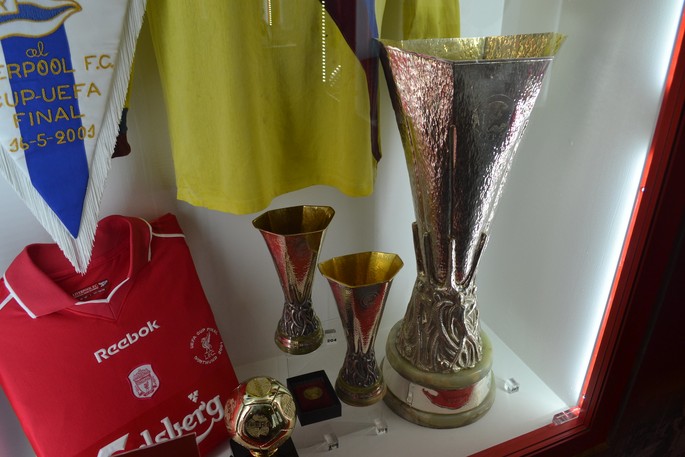
Michael Owen won the Ballon d’Or after winning the UEFA Cup with Liverpool in 2001. Photo by Daniel, flickr
Michael Owen had only just turned 22 when he won the Ballon d’Or in 2001. Given the fact that team achievement is relevant when it comes to a Ballon d’Or win, it is perhaps no surprise that it was a Liverpool player that won it that season, with the Merseyside club having completed a treble of the FA Cup, League Cup and UEFA Cup at the end of the 2000-2001 campaign. Owen was a hugely influential part of that, scoring two goals in quick succession during the FA Cup final to take the game away from Arsenal and ensure that Liverpool won the match 2-1, lifting the trophy.
Whilst Owen wasn’t one of the scorers in the UEFA Cup final, that performance in the FA Cup meant that his name would forever be etched in the memories of Liverpool supporters and football lovers from around the world. Owen would remain at Liverpool for another three years before departing for Real Madrid in the summer of 2004, missing out on the Merseyside club winning the Champions League in 2005. His receiving of the Ballon d’Or in 2001 might well have been due to him being the Premier League Gold Boot winner in both 1997-1998 and 1998-1999.
English Players Who Nearly Won The Ballon d’Or
Whilst the four players above won the Ballon d’Or, there were other players from England who only narrowly missed out on winning the personal award. Here is a look at those who came either second or third in the voting that year:
List of Players Placed in the Ballon d’Or Vote – 1956 to 2022
| Year | Player | Pos. | Club |
|---|---|---|---|
| 2005 | Frank Lampard | 2nd | Chelsea |
| 2005 | Steven Gerrard | 3rd | Liverpool |
| 1999 | David Beckham | 2nd | Manchester United |
| 1996 | Alan Shearer | 3rd | Newcastle United |
| 1986 | Gary Lineker | 2nd | Barcelona |
| 1977 | Kevin Keegan | 2nd | Hamburger SV |
| 1970 | Bobby Moore | 2nd | West Ham United |
| 1968 | Bobby Charlton | 2nd | Manchester United |
| 1967 | Bobby Charlton | 2nd | Manchester United |
| 1963 | Jimmy Greaves | 3rd* | Tottenham Hotspur |
| 1961 | Johnny Haynes | 3rd | Fulham |
| 1957 | Billy Wright | 2nd | Wolverhampton Wanderers |
| 1957 | Duncan Edwards | =3rd | Manchester United |
*Another England based player, Denis Law (Manchester United), finished fourth that year with 45 votes, meaning that Greaves would’ve received more had there not been a split in the English press vote.
Which Countries Have Seen The Most Winners?
Here is a look at the nations that have provided the most wins since the award’s inception:
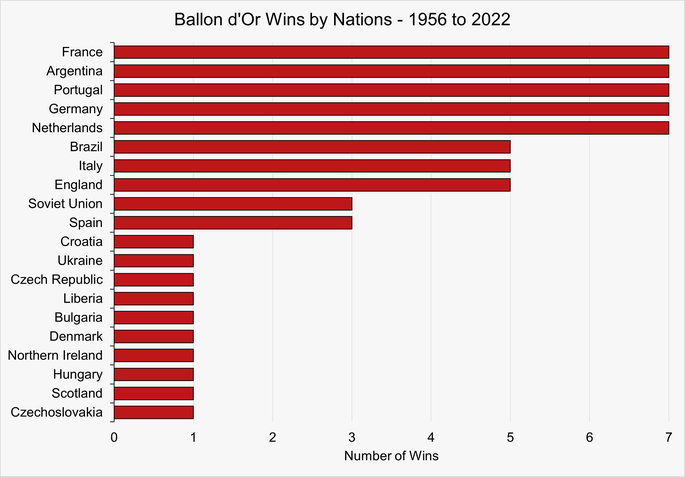
We can also look at which nation has provided the most winning players:
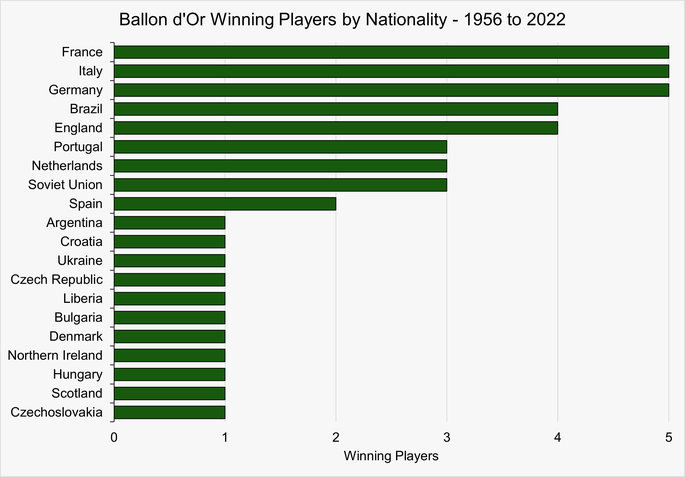
Obviously the name of the country in the table was the name of that country at the time that the player won the Ballon d’Or, hence the reason why Czechoslovakia and the Czech Republic are considered to have won one each rather than two.
As you can see, England sits somewhere in the middle of the countries in terms of the number of Ballon d’Or wins, whilst France, Germany and Italy can be considered to be the most successful on account of the fact that they each produced five winners of the competition.
